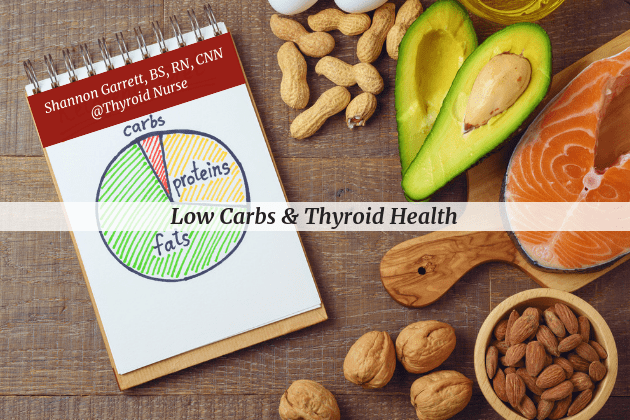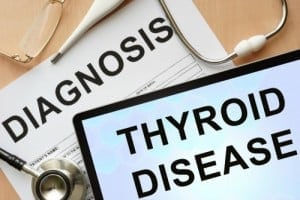
I’m sure you’ve encountered a doctor who at some point advised you to “eat less and exercise more.” We ladies with Hashimoto’s or hypothyroidism hear it all the time, right? With that said, and because it can be a challenge to lose weight, it can be difficult to avoid the temptation to be on a diet. I know because I’ve been there! The problem is that diets don’t work long term. In addition, research shows that restricting types of diets – especially those that restrict carbohydrates can actually reduce thyroid function. Unfortunately, this information is not usually discussed publicly by the multi-million dollar dieting business. I know what you’re thinking….“wow, this is just great…now what do I do?” But the real question is what’s the connection between low carb diets and thyroid disease?
What the Research Says
Low carb diets are frequently recommended by practitioners for the treatment of reactive hypoglycemia, elevated triglycerides, and obesity, and low carb eating is also a popular mainstream choice for those who want to lose weight. Researcher’s Ullrich et al (American College of Nutrition, 1985) found that low carb diets may affect thyroid function. Their study looked at the effects of replacing carbs with either protein or fat in seven healthy young adults (one diet replaced carbs with polyunsaturated fat, and the second replaced carbs with protein). The diet replacing carbs with fat was high in polyunsaturated fat with 10%, 55%, and 35% of total calories derived from protein, fat, and carbohydrate, respectively.
The second diet was high in protein with 35%, 30%, and 35% of total calories derived from protein, fat, and carbohydrate. On the 8th day fasting blood samples were obtained from all participants of each diet. Triiodothyronine (T3) declined the most following the diet high in polyunsaturated fat than in the high protein diet. Thyroxine (T4) and Reverse T3 (rT3) did not change significantly. Even though a meal high in polyunsaturated fats decreased thyroid function, thyroid-stimulating hormone (TSH) declined equally after both diets; and, the insulin level was much higher 30 minutes after the high protein meal than the high-fat meal. The researcher’s found the only obvious benefit of replacing carbohydrate with polyunsaturated fat rather than protein was less of an insulin response and less post peak decreases in blood glucose and lower triglycerides. It is not known what the significance of the lower T3 level was attributed to (SOURCE).
Research scientists Volek, et al (Metabolism, 2002) looked at body composition following a diet that restricted carbohydrates and found enhanced fat loss with preservation of lean muscle mass in obese study participants. In this group, there was an increase in total thyroxine (T4); however, no significant changes in triiodothyronine (T3) uptake (SOURCE).
Overall, it was found that low carb diets and thyroid disease are linked in that a diet of low carbs reduces T4 levels and increases the levels of Reverse T3 although TSH remained normal. Incorporating healthy fats for optimal thyroid function might include a plan that closely replicates fat composition of breast milk: 47.5% saturated, 40.5% monounsaturated, and with only 12% polyunsaturated rather than the 55% polyunsaturated fat found in the eating plans of the Ullrich study.
IMPORTANT: Aside from consuming healthy fats, the bottom line is that in order to convert inactive T4 into the active form of thyroid hormone (T3) to be utilized by the body requires insulin…and insulin is typically very low in followers of low carb diets.
The Best Approach to Healthy Eating
Despite a healthy liver or GI tract, the hormone known as insulin must be present for the conversion. Protein can increase insulin, but how high your insulin goes depends on the type of protein and whether or not you have diabetes. Not to be confusing, but this doesn’t mean you should go out and load up on carbs, e.g. grains, grain-based products or sugars…not at all. What you want is a healthy balance of low-glycemic fruits & vegetables rich in antioxidants, grain-like seeds, and fermented vegetables in addition to healthy fats (monounsaturated & saturated) and lean proteins, e.g. grass-fed beef, organic, pastured chicken, and wild caught fish (I love wild Alaskan & Coho salmon).
Restricting carbs will result in weight loss in the short term…but often at the risk of triggering under-active thyroid along with the rebound effect of weight gain, fatigue, and hair loss. This can be extremely challenging to overcome, as you may already know. The short-term benefit is definitely not worth the potential long-term risk to your thyroid and overall health.
ACTION PLAN: Don’t be a victim of low carb diets and thyroid disease. Honestly take inventory of your eating habits and ask yourself if you’re trying to lose or maintain weight through restricting carbs or strict dieting. And then, consider how well it is working for you. Are you moving toward health through nourishing foods or do you feel like there is room for improvement? Please do what you can to make small changes slowly and over time you will see a difference in the way you feel, inside and out. For starters, try my delicious Lemon and Thyme Salmon with Blood Orange Salsa with a side of grilled or steamed asparagus. In addition, try a couple of my favorite healthy fat salad dressings HERE and HERE.
If you have been following a low-carb diet it’s important to replenish certain vitamins such as water-soluble B vitamins and methylfolate. This complex formula contains all the B vitamins and methylfolate in the correct ratio.
*Remember to hold any vitamin B complex or biotin supplement 7 days prior to a blood draw for thyroid levels. Biotin interferes with the methodology of the lab test and skews the results of thyroid markers. This interference can cause thyroid levels to suggest false hyperthyroidism. To read more on this topic check out my article Biotin and False Results for Thyroid Labs.
You May Also Enjoy
Error: No posts found.
Make sure this account has posts available on instagram.com.








I believe I have metabolic syndrome. I have the symptoms of PCOS though I’m in menopause. My testosterone and DHEA are high without supplementing. I can’t stay asleep between 2am and 6am. Unbelievable belly fat, high blood sugar and cholesterol. I don’t eat junk, I’m Paleo or Whole 30. What you are saying makes sense, but what do we do when we have hashi’s and all this other stuff going on?